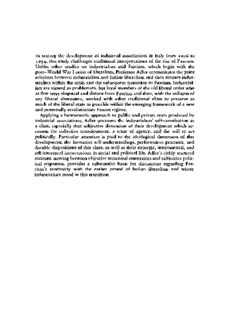
Italian Industrialists from Liberalism to Fascism: The Political Development of the Industrial Bourgeoisie, 1906-1934 PDF
Preview Italian Industrialists from Liberalism to Fascism: The Political Development of the Industrial Bourgeoisie, 1906-1934
In tracing the development of industrial associations in Italy from 1906 to 1934, this study challenges traditional interpretations of the rise of Fascism. Unlike other studies on industrialists and Fascism, which begin with the post-World War I crisis of liberalism, Professor Adler reconstitutes the prior relations between industrialists and Italian liberalism and then situates indus- trialists within the crisis and the subsequent transition to Fascism. Industrial- ists are viewed as problematic but loyal members of the old liberal order who at first were skeptical and distant from Fascism and then, with the collapse of any liberal alternative, worked with other traditional elites to preserve as much of the liberal state as possible within the emerging framework of a new and potentially revolutionary Fascist regime. Applying a hermeneutic approach to public and private texts produced by industrial associations, Adler uncovers the industrialists' self-constitution as a class, especially that subjective dimension of their development which ac- counts for collective consciousness, a sense of agency, and the will to act politically. Particular attention is paid to the ideological dimension of this development; the formative self-understandings, performative practices, and durable dispositions of this class; as well as their strategic, instrumental, and self-interested interventions in social and political life. Adler's richly textured account, moving between objective structural constraints and subjective polit- ical responses, provides a substantive basis for discussions regarding Fas- cism's continuity with the earlier period of Italian liberalism and where industrialists stood in this transition. Italian Industrialists from Liberalism to Fascism Italian Industrialists from Liberalism to Fascism The political development of the industrial bourgeoisie, 1906-1934 Franklin Hugh Adler Antioch College UNIVERSITY PRESS PUBLISHED BY THE PRESS SYNDICATE OF THE UNIVERSITY OF CAMBRIDGE The Pitt Building, Trumpington Street, Cambridge, United Kingdom CAMBRIDGE UNIVERSITY PRESS The Edinburgh Building, Cambridge CB2 2RU, UK 40 West 20th Street, New York NY 10011-4211, USA 477 Williamstown Road, Port Melbourne, VIC 3207, Australia Ruiz de Alarcon 13,28014 Madrid, Spain Dock House, The Waterfront, Cape Town 8001, South Africa http://www.cambridge.org © Cambridge University Press 1995 This book is in copyright. Subject to statutory exception and to the provisions of relevant collective licensing agreements, no reproduction of any part may take place without the written permission of Cambridge University Press. First published 1995 First paperback edition 2002 A catalogue record for this book is available from the British Library Library of Congress Cataloguing in Publication data Adler, Franklin Hugh, 1944- Italian industrialists from liberalism to fascism: the political development of the industrial bourgeoisie, 1906-1934 / Franklin Hugh Adler. p. cm. ISBN 0 52143406 8 1. Employers' associations - Italy - Political activity. 2. Industrialists - Italy - Political activity. 3. Liberalism - Italy - History.. 4. Fascism - Italy - History. 5. Italy - History-1870-1915. 6. Italy -History-1914-1945. I. Title. HD6948.I8A34 1995 332'.4'094509041-dc20 95-8060 ISBN 0 52143406 8 hardback ISBN 0 52152277 3 paperback Dedicated to the memory of my grandfather Jacob £. Abrams, a gentle man who loved books Contents Preface page ix List of abbreviations xv Introduction i Post-Risorgimento liberalism i The Giolittian system 11 Industrialization and the rise of an industrial bourgeoisie 18 1. Associational development during the Giolitti era 30 The Industrial League of Turin 3 4 Toward a productivist liberal-technocratic ideology 5 5 Industrial relations and the state 61 Political activity 71 2. The First World War: a precorporatist experience 89 Italy's intervention: an authoritarian precedent 92 The industrial mobilization 101 War-inspired productivism 119 Productivist programs and the industrialists 135 Precorporatism and lessons learned from the war 149 3. The postwar crisis and the rise of Fascism 160 The economic crisis 162 The social crisis 166 The political crisis 173 The rise of Fascism 180 Industrialists and the rise of Fascism 192 Initial postwar orientations 195 The occupation of the factories 222 The red wave ends 238 viii Contents Industrialists and the political crisis 248 Industrialists and Fascists 264 4. Liberal-Fascism 284 Industrialists and liberal—Fascism 303 Confindustria and the Fascist syndicates 310 The Matteotti crisis and the collapse of liberal-Fascism 3 29 5. Industrialists and nonintegral corporatism 344 From liberal—Fascism to nonintegral corporatism 347 Nonintegral corporatism 357 192 j: the year of transition 3 69 Working from within 387 Confindustria and the Great Depression 418 Conclusion 437 Index 455
Description: